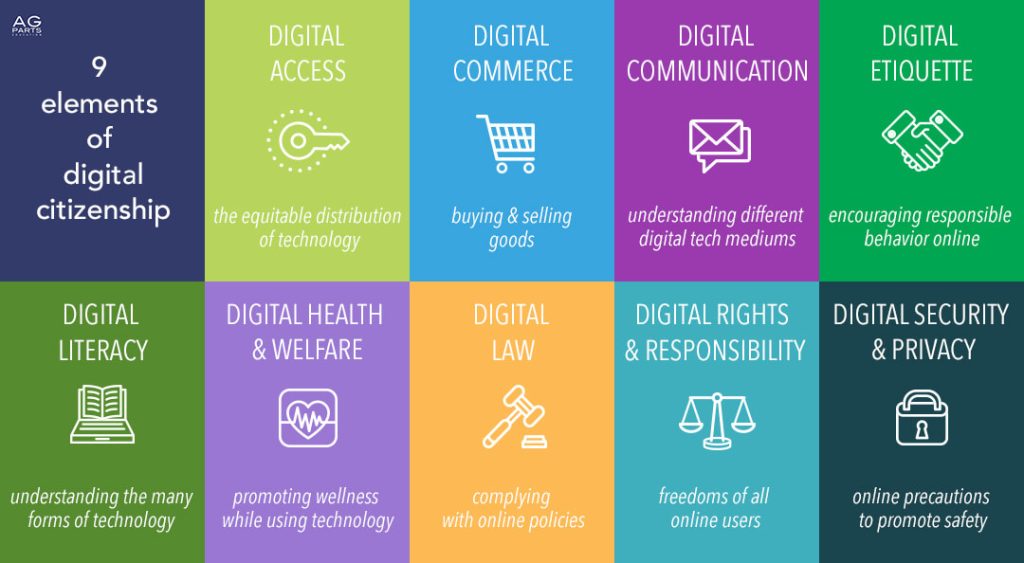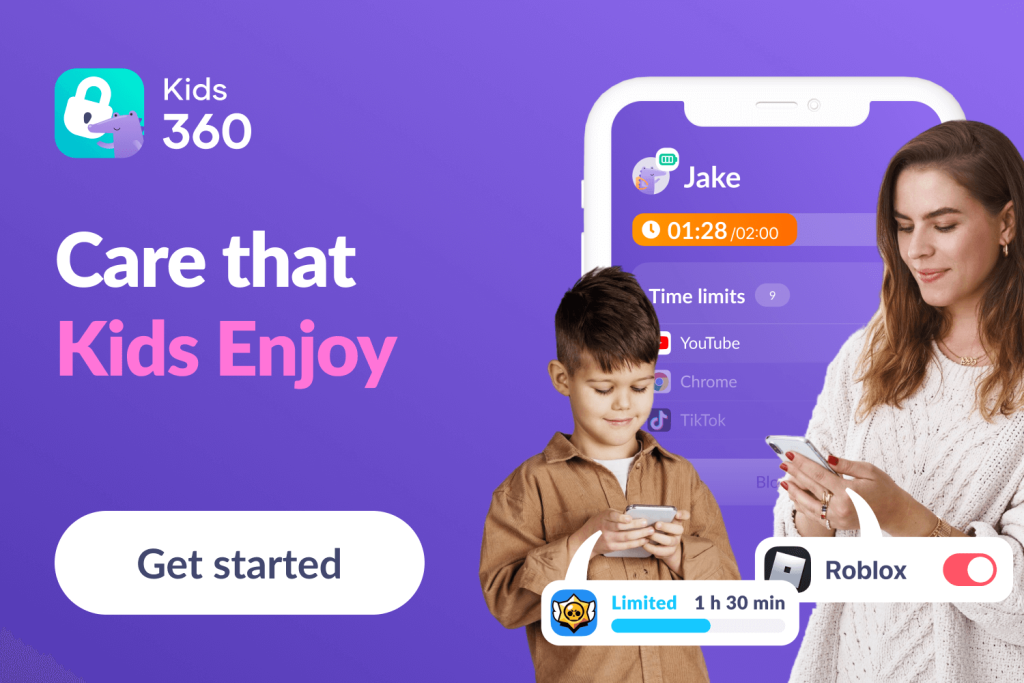What Is Digital Citizenship, and Why Does It Matter for Kids Today

Digital citizenship is, hands down, one of the most important skills your kids can master right now.
So much of childhood happens online these days, from classroom discussions to late-night texts filled with emojis you don’t understand. You want your kid to be safe and savvy, a leader instead of a lurker, and kind even when nobody’s looking.
That’s where digital citizenship comes in.
Let’s break it all down and get crystal clear on how you can raise a child who knows how to walk, talk, and thrive in the wild world of the web.
Contents:
- What Is Digital Citizenship?
- 9 Elements of Digital Citizenship
- Why Digital Citizenship Matters for Kids and Teens
- Common Challenges Parents Face
- 7 Core Skills Every Digital Citizen Should Learn
- How Parents Can Teach Digital Citizenship at Home
- FAQs
What Is Digital Citizenship?
The digital citizenship meaning is best defined as the Golden Rule for the internet, but with a side of street smarts. It covers everything from “don’t be a jerk in the group chat” to not clicking those flashy “YOU WON!” banners.
At its core, digital citizenship in schools and at home just means using technology in ways that are safe, smart, and respectful, both to yourself and to everyone else online.
Being a stellar digital citizen means asking smart questions before believing captions, thinking twice before you post (even if you’re feeling spicy), and choosing passwords that don’t include your pet’s name and your birth year. For kids and teens, what this ultimately means is building an online reputation they can be proud of.
9 Elements of Digital Citizenship

Credit: agpartseducation.com
Digital citizenship isn’t one-size-fits-all. It’s actually made up of nine different, but connected, elements. Here’s an overview.
1. Digital Access
Not every kid has the same gadgets, Wi-Fi speed, or access to learning apps. If your family’s ever waited in the school parking lot to snag a hotspot signal for homework, you know this struggle well. Good digital citizens support equal online access, maybe by helping schools with “device drives” or simply looking out for classmates who can’t join the group video call.
2. Digital Etiquette
Does “no ALL CAPS” mean anything to your household? That’s just one piece of netiquette. It’s about being polite online: saying sorry in DMs or not ghosting friends without a word.
Digital etiquette’s basically the same rules you’d use at a birthday party: don’t yell, be sure to share, and always say thank you.
Read more: What is Netiquette? A Guide to Teaching Online Etiquette to Your Kids.
3. Digital Literacy
Consider this your family’s BS detector. Digital literacy means knowing that Google doesn’t always give you the right answer, recognizing deepfake videos, and knowing that “miracle cures” usually aren’t. It also means checking who made something before you share it and knowing when to pause and fact-check.
4. Digital Communication
Text, Twitch, TikTok, emails…online communication is a minefield of emojis and quick-fire language. A text to Grandpa needs a different touch than responding to friends on a group Snap. Digital citizens can code-switch between platforms, using the right tone for the right person.
Pro tip: “kk” is not how you reply to the school principal.
5. Digital Law
Yes, the rules still apply online! Downloading pirated movies? Big no. Copying someone else’s TikTok without credit? Also not okay.
Kids need to know the basics, like respecting copyrights, reporting cyberbullying, and staying far away from anything that smells illegal.
Illegal Streaming Sites Your Child May Be Using.
6. Digital Rights and Responsibilities
Your child has rights online: privacy, freedom of speech, and safety. But rights come with responsibilities, like not trolling, reporting scams, and never sharing embarrassing photos of friends. The golden rule is to leave every group chat and gaming server better than you found it.
7. Digital Health and Wellness
Have you ever noticed your kid hunched over their tablet, zombie-eyed at bedtime? That’s where digital health and wellness come in. This means balancing screen time, keeping ergonomics in mind (get familiar with neck stretches!), and making sure tech isn’t wrecking their mood or sleep.
Related: Revealing the 5-Hour Screen Time: What Kids are Doing on Their Phones.
8. Digital Security
Passwords are not “123456.” Digital security means locking down accounts, not falling for those “please send money ASAP” emails, and learning how to double-check if a link is fishy. Kids need to learn not to overshare (no addresses or class schedules!) and to set privacy controls, pronto.
9. Digital Commerce
You know your kid’s ready for digital commerce when they keep asking for Robux or sneak in-app purchases when you blink. Teaching them to spot scams, understand the real cost of virtual goods, and manage money wisely are all steps to take before you hand them the card.
Why Digital Citizenship Matters for Kids and Teens
The web is their world now. Pew Research reports that 95% of teens say they have access to a smartphone, and nearly half say they’re online “almost constantly.”
That’s not changing anytime soon. Teaching digital citizenship gives them the know-how to succeed in this new world.
Kids who “get” the importance of digital citizenship dodge scams and shady strangers, but they also build strong, positive digital footprints. That matters because future colleges, coaches, and employers absolutely check out online lives. A thoughtful Instagram profile can be a ticket to opportunity, while one bad viral video can linger forever.
Plus, it goes way beyond safety. Kids learn social integrity: standing up against cyberbullying, sticking up for friends, and bringing a sense of community, whether they’re gaming, learning, or hanging out on YouTube.
Common Challenges Parents Face

Bricolage/Shutterstock.com
Feeling a little lost in the wilds of TikTok trends and online lingo? You’re in great (if slightly confused) company. Here’s what trips up most parents:
- The fear of losing control. When your kid’s world is partly invisible, you naturally want to clamp down tight.
- Keeping up with new apps and “no cap” slang. Just when you’ve figured out Roblox, along comes BeReal or whatever’s next.
- Is monitoring the same as spying? You want to keep your kid safe, but nobody wants to be the “Big Brother” parent. How do you balance their privacy with your Internet safety rules?
The answer: Don’t be the online police. Be their guide. Instead of shutting everything down, encourage curiosity. Chat about why privacy settings matter, why some platforms are off-limits, and even let them teach you a thing or two.
The more open the line of communication, the more your child will come to you with the weird stuff (which, let’s face it, is just part of raising kids today).
7 Core Skills Every Digital Citizen Should Learn
The digital world isn’t all danger and doom. It’s amazing, too! Here are seven core skills your child should master, along with ways to make the lessons stick.
Online Safety for Kids
Kids need radar for red flags. Teach them what cyberbullying actually looks like (nasty DMs, targeted exclusion) and make sure they know to tell you or a safe adult if it happens. Practice “what would you do?” scenarios, like handling friend requests from strangers or suspicious links in gamer chats.
Respectful Communication
The grandma rule really does work, and it goes like this: Would you say it to Grandma’s face? If not, don’t post it. Set household standards, like “no flame wars at dinner,” and remind your child that emojis can’t always save the day.
Critical Thinking and Media Literacy
That meme might look real, but is it? Play detective together as you do your own media studies. Check who posted it, look for clues, see if real news sites are covering the story. Challenge your kids: If it sounds too wild to be true, pause before you share. Swap fact-checking games (prizes help!).
Privacy and Data Protection
Have “the talk” early about privacy. It’s not just about stranger danger, either, but about knowing not to overshare personal details, turning off location tagging, and choosing private profiles. Show your child how to check privacy settings (you might be surprised what’s public by default) and remind them that once a secret’s online, it’s out there.
Responsible Internet Use
Remind your kids that social media lives forever. Colleges look at posts, and future bosses Google candidates. Talk about thinking before sharing and the risks of posting #drama. Show them how small posts can go viral, sometimes in ways you didn’t expect.
Online Accountability
Oopsies happen. The important thing is owning up to mistakes, apologizing when they’ve crossed a line, and cleaning up digital messes just like real-life ones. Remind your child that being behind a screen isn’t a license for bad behavior, and help them make it right if things go sideways.
Screen Time Management
Screens are fun, but so is sleep, right? Too much TikTok can mean cranky mornings.
Work together to set screen limits, talk about what’s fair, and use tools like Kids360 to help make screen time rules easy (and not a fight). It helps you set time limits, schedule device-free family dinners, and even reward healthy habits, all without yelling “turn it off!” for the tenth time.
How Parents Can Teach Digital Citizenship at Home
Raising a good digital citizen is easier (and way more fun) when you make it part of daily life. Try these tips:
- Chat early and often: Don’t wait for a crisis. Start simple conversations about screen time, sharing, or privacy as soon as your child gets online.
- Make a family tech plan: Agree on basics like “no phones during meals,” blackout times for devices, or app-free weekends. Get your kid’s input. They’ll surprise you!
- Model the behavior you want to see: Don’t text and drive, and try not to scroll through TikTok during family movie night. If you make a privacy mistake, own up.
- Use real-life teachable moments: News story about a hack? Show your child how to update passwords. Neighbor’s account got phished? Double-check your settings together.
- Build AI literacy: In 2025, a big part of digital communication is understanding what’s real, and what’s from a robot. Talk to your child about healthy skepticism when it comes to AI-generated content.
- Be curious, not critical: Ask for a tour of your child’s favorite app. Play a round of their go-to game. The more you know their world, the more you can guide them.
- Explain the “why,” not just the “what”: Instead of “don’t click weird links,” try “hackers use these to steal info, and those free Robux offers are nearly always scams.”
- Tackle privacy together: Review app settings and GIF folders together. Talk about what’s safe to share and what needs to stay private.
You’re Raising a Digital Citizen. Together, Let’s Make It Awesome
You don’t need to battle every app or know every meme. You just need to show up, ask questions, and keep the conversation going. When you make digital citizenship a team project, your child feels supported (and a whole lot more likely to come to you with the big stuff).
Go ahead, be their guide, their coach, their co-pilot online. The internet’s not going anywhere.
But with curiosity, good habits, and a touch of humor, you and your child can make it a safer, kinder, and more amazing place.
FAQs
What is the meaning of digital citizenship for kids?
Digital citizenship refers to the responsible, ethical, and safe use of technology and the internet. It encompasses the skills and behaviors needed to be a positive member of online communities, including understanding online safety, etiquette, and digital rights.
What is the best definition of a good digital citizen?
A good digital citizen is someone who uses technology to make their community and the world a better place. They are empathetic, critical thinkers who act responsibly, safely, and respectfully online, understanding that their digital footprint is a reflection of their character.
What is an example of a digital citizen?
A good digital citizen is someone who reports cyberbullying when they see it (and works on their own toward cyberbullying prevention), respecting others’ opinions in online discussions, protects their personal information with strong passwords, and gives credit to creators when sharing their work.
What are the 5 key principles of digital citizenship?
While there are nine common elements, five core principles are often emphasized. These include respect (treating others online with kindness and empathy), education (learn how to use technology effectively and practice critical literacy), protection (safeguard yourself and others from harm by practicing online safety and security), responsibility (be accountable for your online actions and their consequences, and access (advocate for equitable technology access for all).
Cover image: Tumisu/Pixabay
Проверьте электронный ящик




















